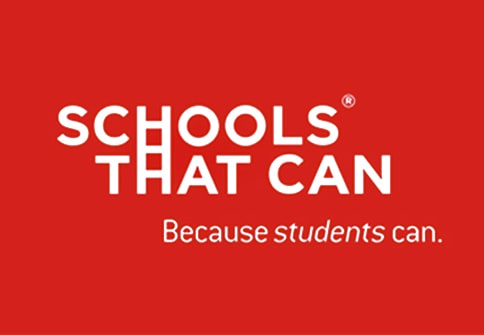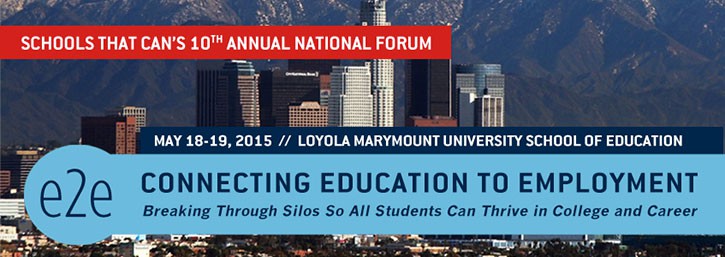Schools That Can Is 15 Cities Strong, Planning May Conference

Jennifer Husbands was recently named Executive Director of Schools That Can Chicago. I connected with her last week and to add some national color we added Michael Druckman, Executive Chair and Stephanie Whited, Director of Communications & Marketing of Schools That Can.
Where and when did Schools That Can (STC) start? When was the decision made to become a national network?
STC began as a national network of high performing and high potential urban schools, from district, charter, faith-based and independent sectors, in 2005. We wanted to identify and recognize these schools for their model quality and share their practices to expand quality urban education across the US. Our official kickoff was in NYC at our first conference, the STC National Forum, now in its 10th year. We think K-12 educators from STC are thought leaders, so at our Forum each year, we feature them alongside speakers such as Cory Booker, Geoffrey Canada, Angela Duckworth, Joel Klein, Clayton M. Christensen, and Howard Fuller. The success of our Forums confirm valuable innovations are taking place inside urban schools, and high-quality practices can be shared and implemented across school sectors.
Our network has now grown to 135 high-performing and high-potential schools in 15 cities. In addition to STC Milwaukee that as an exception formed its own 501c3 in 2010, we have full time executive directors curating local programs in Chicago, Newark, and NYC, and we have dedicated volunteer-led programs in action or formation in five other cities. Each city curates programs based on its unique landscape and schools’ needs, drawing on the strong knowledge and practices within its network. Similarly, our national programs, including our Forum, address trends nationwide, like needs to increase opportunities for real-world learning, build 21st century skills, and connect education to employment (e2e), which is the theme of this year’s Forum.
Is the primary metric the number of proportion of ‘quality seats?’
We envision high-performing schools effectively preparing underserved students for college and career, consistently. Certainly the number of existing or potential quality seats is an important metric, particularly at the city level. For example, we are very proud STC Newark represents over 20% of the city’s K-12 student population.
We also think additional metrics, such as those involved in how we validate schools into our network and how we measure the impact of our local and national programs (including how we’ll measure our impact on connecting education to employment), are important indicators of our progress. We have a mature system for validating our schools with several benchmarks on school quality. At the high-performing member schools in our network, at least 60% of students are low-income (as determined by federal Free & Reduced Lunch rates), and schools meet high benchmarks for academic achievement, attendance, student and staff retention, and graduation (visit our site for exact figures).
We help our member schools adapt to ever-changing definitions of high-quality and help our high-potential schools meet these benchmarks. We’re gainfully improving how we measure our own success, and we can report for 2014-15 to date, 92% of all participants in our programs have gained a strategy.
STC has it’s roots in “no excuses” schools. Are member cities beginning to incorporate personalized learning?
We have been around for 10 years now, and in that time, there has certainly been a shift in the conversation around the goals and tactics of education. Many of our early partners were indeed “no excuses” schools who work relentlessly to help students achieve traditional performance metrics like grade-level proficiency. We still value rigorous academics and quality teaching practices, but have also begun highlighting and sharing innovative practices that support deeper learning like personalized learning, project-based learning, STEM, and more. Our new initiatives, STC e2eLabs will be immersive, hands-on learning environments, designed with the help of Gensler, to make student-centered learning more accessible and offer a space for schools to experiment with next generation learning styles.
Your conference is coming up, where and when is it?
Our 10th Annual Forum will be held May 18-19 at Loyola Marymount University School of Education in Los Angeles on the theme Connecting Education to Employment (e2e). Obviously the 2013 McKinsey Report was an eye-opener, and we feel well positioned as a large network of cross-sector schools to share effective practices and build solutions that address common challenges our schools face in building the career pathways critical for the future of our students and nation. We were additionally struck by stories from our school leaders that their alumni who had gone on to graduate college were coming to them looking for work, because they couldn’t find it elsewhere. Richard F. Clark, President of Saint Martin de Porres High School in Cleveland, summed it up, “We’re not living up to our promises if we’re getting kids to and through college but not enabling and empowering them to get valuable jobs…We keep asking ourselves: what’s the ultimate goal?”
Because we work with some of the best urban schools in the nation already disrupting the status quo, we’re poised to address this critical problem. And with the added knowledge and dedication of our partners from higher education, innovative education organizations, and industry, we can and will build learning solutions.
We’re thrilled about the diversity of participating leaders (take a look at the agenda) who want to build solutions to address this critical problem, such as our keynote, Project Lead The Way CEO and President Vince M. Bertram, Deeper Learning author Monica Martinez, and GameDesk CEO Lucien Vattel. Our opening and closing plenaries both break across school divisions (grade levels and governance styles) and professional barriers (industry, community, and innovation). We’re also excited about the abundance of take-home strategies available from sessions such as Design Thinking for Educators, Common Core Meets Real World Learning, Project Based Learning, and True Grit, led by Educators for Excellence: LA.
Join us May 18-19! We believe student success should be a priority for leaders from all sectors. As we like to say, “Together, we can ensure all students can thrive in college and in career; we have no excuse, #BecauseStudentsCan.”
Who are the major supports and partners?
Major financial supporters include:
- Corporate sponsors: Boston Properties, Vornado Properties, Morgan Stanley, Tishman Speyer
- Foundations: such as Newark Charter School Fund, Victoria Foundation, Friedman Foundation, and Perkins-Malo Foundation
- Generous support from individuals on our National and Local Boards
Partners in our work include:
- Higher-Ed: West Point, NYU School of Professional Studies, Hunter School of Education, Purdue
- Industry: Gensler, 72 and Sunny, Ogilvy-Mather, Northrop-Grumman
- Ed Innovators: i2 Camp, Maker State, Breaker, SOLE, Robert F. Kennedy Human Rights
- And of course, the phenomenal K-12 educators, from all sectors – district, charter, faith-based, and independent, who’ve opened their doors to us and each other, despite popular attention to their differences, who share their successes and challenges and invest in the future of all students.









0 Comments
Leave a Comment
Your email address will not be published. All fields are required.